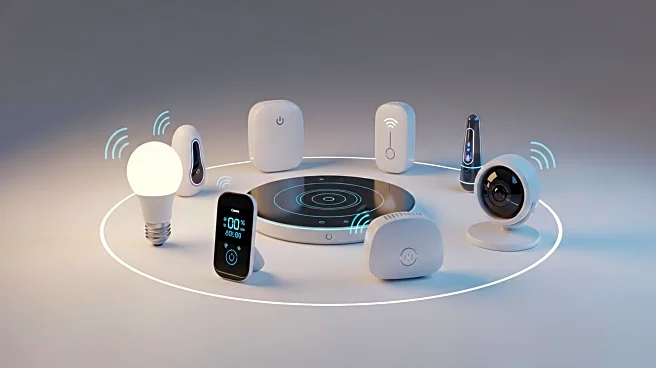What's Happening?
Consumer Reports has conducted an evaluation of various AI-powered smart home devices, highlighting both their benefits and drawbacks. The report notes that while these devices, such as robotic vacuums and smart thermostats, offer convenience and efficiency, they often come with higher price tags compared to traditional appliances. The Samsung Bespoke refrigerator, equipped with an AI vision camera, was found to have limited success in recognizing groceries. Robotic lawn mowers require pre-mowing to a specific height, adding complexity to their use. Despite these challenges, robotic vacuums have improved in navigating obstacles and cleaning effectively. Smart thermostats, like the Google Nest Learning Thermostat, are praised for their ability to reduce utility bills by automatically adjusting temperatures and connecting to demand-response programs.
Why It's Important?
The integration of AI into household appliances represents a significant shift in lifestyle, offering potential benefits such as energy efficiency and convenience. However, the high cost and complexity of these devices may limit accessibility for some consumers. The ability of smart thermostats to connect with utility programs and offer discounts could incentivize adoption, potentially leading to broader energy savings. As these technologies evolve, they may influence consumer behavior and expectations regarding home automation. The report also emphasizes the importance of security and privacy settings, suggesting that consumers should be cautious about data sharing.
What's Next?
As AI-powered smart home devices continue to develop, manufacturers may focus on improving their reliability and ease of use to enhance consumer satisfaction. The industry could see increased competition, driving innovation and potentially reducing costs. Consumers are likely to demand more robust privacy protections, prompting companies to prioritize security features. The ongoing evaluation of these technologies by organizations like Consumer Reports will play a crucial role in guiding consumer choices and shaping market trends.
Beyond the Headlines
The rise of AI in smart home technology raises ethical and privacy concerns, particularly regarding data collection and usage. As these devices become more integrated into daily life, questions about the balance between convenience and privacy will become more prominent. The long-term impact on energy consumption and environmental sustainability could be significant, as more households adopt energy-efficient technologies. Additionally, the cultural shift towards automated living may influence social dynamics and expectations around domestic roles and responsibilities.









